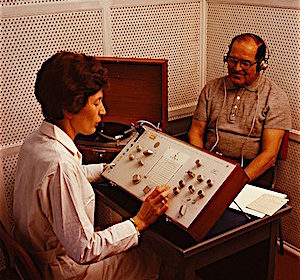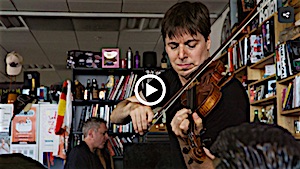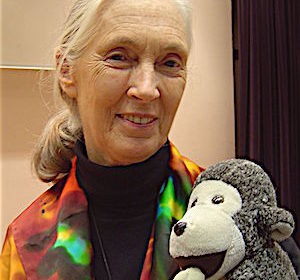Musical Performance: Common At The White House

Musical Performance: Common At The White House
October 4, 2016 • “The veteran rapper fronts an all-star band at the White House.” (NPR)
Photo: NPR


Musical Performance: Common At The White House
October 4, 2016 • “The veteran rapper fronts an all-star band at the White House.” (NPR)
Photo: NPR

Watch tonight’s Vice Presidential Debate, streaming live here on Face Activities. The running mates debate substantive issues, and posture for dominance, at tonight’s debate, starting 9 pm Eastern Time (Wednesday, October 4.) Tim Kaine and Mike Pence, both experienced politicians, go head to head for the first time during the 2016 Presidential campaign.
Watch the VP Debate tonight online – 9 pm ET (NBC News – Yahoo)
UPDATE: The debate made for an excellent contrast between Pence and Kaine. Both men were under enormous pressure to perform well, and score points with voters, particularly with the block of undecided, college educated women, who will likely make the difference in this election, according to many pundits.
Kaine was very aggressive, and at times downright rude, frequently interrupting Pence and calling out the Trump campaign on numerous inaccuracies and falsehoods, fulfilling the traditional VP role of “attack dog.” For example, Kaine kept hammering away at his opponent, demanding to know why Trump has said so many disrespectful things to women and minorities, and why Trump didn’t pay taxes for 18 years, as per recent revelations. Pence, on the other hand, was very dignified, and remained calm in the face of withering fire from Kaine.
However, there was only so much Pence could say when defending Trump, who has in fact made many undignified and seemingly prejudiced remarks, and actually did avoid paying taxes legally for almost 20 years, following a $916 million business loss, due to exceedingly favorable tax codes for wealthy entrepreneurs (exactly the sort of thing that the Clinton campaign is speaking out against.) Many who watched the debate unfold felt that Kaine won on substance, and Pence won on style. It’s clear that Pence’s cool, controlled and consistent delivery was the hallmark of a polished and practiced career politician, with Presidential ambitions of his own.
Both men scored points with their bases, and will likely be lauded for their performances (though Kaine is picking up some flack for his overly aggressive style) but it seems unlikely that Pence will bring many of those much needed undecided, college educated women voters over to Trump’s camp. So in that way at least the debate may be viewed as a win for the Clinton campaign.
Photo: wdbj7.com / Gage Skidmore / CC By SA 2.0 – Tim Kaine / Facebook

Shrimps for a Day, 1934
A short film by Gus Meins
“A magic lamp lets a young couple become kids again and exposes a mean old man who runs his orphanage like a prison.” (IMDB.com)

Musical Performance: Dandy Warhols, ‘Catcher In The Rye’
October 4, 2016 • “Like the song’s namesake novel, the video opens on a sullen Holden Caulfield character, complete with a red hunting cap and a suitcase in hand, smoking and strolling aimlessly down the sidewalk.” (NPR)
Photo: NPR (screen capture)

First Listen: Conor Oberst, ‘Ruminations’
September 29, 2016 • “Oberst’s distinctive warble is set against a spare patchwork of acoustic guitar, piano and the occasional harmonica, drawing most of the attention to his dark, personal words.” (NPR)
Photo: Amelie Raoul – Courtesy of the artist / NPR

Valid scientific studies are supposed to be reproducible. That means other researchers using the same methods should get the same or very similar results. But we are learning that that’s not always the case. Especially in psychology, well-known studies have failed the reproducibility test. Most recently, researchers looking at two studies from the 80s and 90s, one about facial expressions affecting mood, and the other about a phenomenon called ego depletion, in which a person’s willpower can wear down over time, have failed to reproduce the original results.
This is both unsettling and intriguing. The purpose of science is to reduce uncertainty, to delve into the darkness and help make the unknown known to humanity. But if key studies aren’t repeatable, our understanding may rest on shakier ground than previously thought. And part of the problem lies with the way science is conducted. Great priority is placed on breaking new ground, discovering novel things of great interest. Checking the work of other scientists by replicating previously conducted studies is not a glamorous job, and it’s given a much lower priority. However, this is exactly what needs to happen to deal with the reproducibility problem effectively.
Since we value science and the advancement of knowledge, what are we to do? Perhaps major universities need to revamp their approach to tenure, rewarding scientists for successfully reproducing, or refuting, the results seminal research, as well as rewarding innovative researchers, with tenure track positions? Perhaps the government should establish a fact-checking department, and put aside some money every year to check for reproducibility on at least some key studies?
In addition, and perhaps more crucial, society needs to fund basic scientific research at a much greater level, and part of that funding should provide grants for this kind of fact-checking research work.
Learn more about the reproducibility problem in science (sciencealert.com)
Photo: By Deutsche Fotothek, CC BY-SA 3.0 de, Wikimedia Commons

Musical Performance: Joshua Bell & Jeremy Denk
September 30, 2016 • “Two A-list classical artists work up a sweat as they revel in the turbulent, tender music of Brahms.” (NPR)
Photo: NPR

Visit Jane Goodall’s Petition to end wildlife trafficking, on Change.org. She’s calling for the wildlife trafficking problem to be a priority for the international community to focus on. Many species are endangered and facing extinction in our modern world, and once they go extinct, there’s no return—-we lose them forever. Wildlife trafficking contributes to this threat, and even if animals aren’t killed outright, trafficking often leads to cruel treatment of animals for callous commercial reasons. This is a profound tragedy and a great threat to our planet’s ecosystem that we must strive to prevent.
Here’s the text of her petition for the members of Face Activities to read. Please visit her page on Change.org to support her efforts:
“Hello, my name is Jane Goodall, and I’m here to ask for your support to end wildlife trafficking. I spend about 300 days every year traveling and talking to people about how we can help animals, but I know the power of social media can connect far more people much more quickly than anyone could do on their own. Please help me end wildlife trafficking.
Greed and the desire for increasingly rare “trophies” have resulted in a boom in illegal wildlife trafficking. This is a gruesome trade that is rapidly pushing the earth’s endangered species toward extinction. I’m meeting with some of the top conservation leaders in the world this year, and urgently need your support to tell them you want wildlife trafficking to be a priority for the international community to focus on.
My colleagues and I at the Jane Goodall Institute have seen the horrific wounds that wildlife trafficking inflicts on its victims. As a conservation charity that works on the ground in a number of African nations and with incredible global partners, we know the slaughter of such incredible animals is cruel and indefensible. We have also seen the heroism and loss of life of Rangers who defend wildlife against poachers: we cannot let them die in vain.
At our Tchimpounga Chimpanzee Rehabilitation Center, we see apes who have been maimed by lethal snare traps, monkeys suffering from bullet wounds, and infant chimpanzees who have been pried from their mother after she was shot dead by poachers, her body headed for markets where people illegally purchase chimpanzee meat.
The chimpanzee infants who come to us are often gravely injured, severely ill and suffering from deep psychological wounds that may never heal. They, however, are the lucky ones. The infants who do not make it to Tchimpounga are often trafficked into the illegal exotic pet or entertainment trades, destined to lead short, lonely lives filled with pain and abuse.
This is not a simple issue, but one filled with examples of the intense pressures of poverty, lack of training in enforcement, governmental corruption, and the careless demand for wildlife products by global consumers.
The inhumane practice of invading a protected animals’ natural habitat to obtain “parts” based on this complicated global market demand by capturing and/or killing is destroying our world’s most precious species, and it needs to stop.
The facts reflect the urgency of this crisis:
And these numbers may be estimates based on population sizes that don’t even exist – as there are fewer and fewer animals left to poach each year.
The Jane Goodall Institute has created the Jane’s Traffic Stop campaign, and I want you to be part of it. Our hope is that we will help stamp out wildlife trafficking for good by creating an enormous community of supporters on social media who will continue to hold key decision makers accountable in the fight against this violence.
I strongly believe that from majestic elephants to the smallest butterflies, threatened and endangered animals should be celebrated and left to live their lives … wild and free.
But no one person can do it alone. And we need support. This movement needs you!
So stand up to wildlife trafficking by signing this petition to show your support, and help me bring this message of hope to groups like the IUCN at the World Conservation Congress, the International Primatological Society at their biannual congress and CITES at the CoP17 meeting in South Africa this year.
We must tell the world that wild animals were not put on the earth to be hunted to extinction and sold off in pieces as trinkets and trophies. We also must not support the business of wildlife trafficking, and shop with a greater awareness to avoid buying illegal animal products or support companies that do. Each of us is only one voice in the fight to stop illegal wildlife trafficking, but if all of you as a collective join me and care enough to speak up, our message will be impossible to ignore.
I’ll be working closely with our partners to ensure the signatures on this petition add further pressure and momentum in this global movement to save wildlife. Sign this petition now, and join us in Jane’s Traffic Stop as we share additional actions and keep you up to date in the coming weeks and months.
Thank you.
-Dr. Jane Goodall”
Photo: By Jeekc – Self-published work by Jeekc, CC BY 2.5, https://commons.wikimedia.org/w/index.php?curid=1309157

There are many places in the world with limited access to clean, safe drinking water, and energy. A new invention will help people in these challenged regions collect drinkable water, while minimizing the energy required to achieve that goal. An Israeli company named Water-Gen has designed a machine that uses the principle of condensation to extract drinking water from the atmosphere, using very little energy in the process.
This kind of innovation is extremely important for the long-term benefit of humanity. Currently many heavily populated regions are challenged by resource scarcity and economic hardship. This invention will help people in these regions to survive, and perhaps prosper, even with limited resources. Such technologies may make a crucial difference right now, and as the world-wide effects of climate change take hold in the coming decades, they may become increasingly important.
“When kids learn about the planet’s water cycle, they’re taught a simple concept: our atmosphere is filled with water vapour that has evaporated from the bodies of liquid water we see around us. When the vapour’s temperature gets low enough, it gets turned back into water.
The presence of that vapour becomes especially apparent in the summer when droplets collect on glasses of ice water and air conditioning units drip onto unsuspecting passersby…” (Science Alert)
Learn about water extracting machine (Science Alert)
Photo: Water-Gen / Science Alert

Musical Performance: Blue Man Group
September 26, 2016 • “The world-famous entertainers retrofitted their instruments and confetti cannons to fit the desk.” (NPR)
Photo: NPR